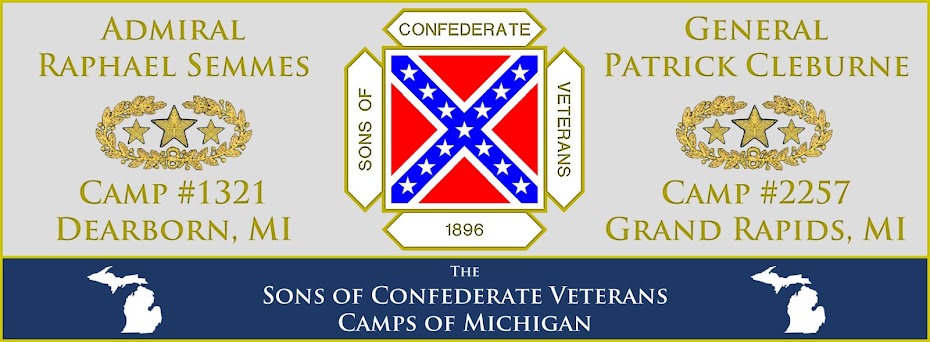 |
| [Lincoln at Gettysburg on November 19, 1863] |
The speech that Lincoln made that day was only a couple minutes long, three at most, but is one of the most studied and remembered in the entire history of the world. Though few will admit it, it is also one of the greatest examples of unfounded political rhetoric ever uttered by a politician.
While there are about 5 "official" versions of the speech, over which historians argue was actually the one spoken by Lincoln, here is the text of the most likely version of the famous/infamous Gettysburg Address delivered that day...
"Four score and seven years ago our fathers brought forth, upon this continent, a new nation, conceived in Liberty, and dedicated to the proposition that all men are created equal.While an absolutely beautifully written speech, the Gettysburg Address is not much more than just that - beautiful words. Unless read completely out of context from how Lincoln intended it to be understood, the speech is mostly fiction. It was the Confederate soldiers, not those in Union blue, who actually fought to achieve "a new birth of freedom," and that "government of the people, by the people, for the people, shall not perish from the earth." As Thomas DiLorenzo says, when Lincoln speaks of the nation, "[he] really means a centralized government that would pursue the path of empire - precisely the kind of government the American revolutionary generation seceded from. It was instituted by the Lincoln regime not by a constitutional convention or by any other peaceful and legal means, but by killing one out of four adult males in the Southern states who resisted being part of Lincoln’s 'new nation.'"
"Now we are engaged in a great civil war, testing whether that nation, or any nation, so conceived, and so dedicated, can long endure. We are met here on a great battlefield of that war. We have come to dedicate a portion of it as a final resting place for those who here gave their lives that that nation might live.
"It is altogether fitting and proper that we should do this, but in a larger sense we can not dedicate - we can not consecrate - we can not hallow this ground. The brave men, living and dead, who struggled, here, have consecrated it far above our poor power to add or detract. The world will little note, nor long remember, what we say here, but can never forget what they did here. It is for us, the living, rather to be dedicated here to the unfinished work which they have, thus far, so nobly carried on. It is rather for us to be here dedicated to the great task remaining before us - that from these honored dead we take increased devotion to that cause for which they here gave the last full measure of devotion - that we here highly resolve that these dead shall not have died in vain; that this nation shall have a new birth of freedom; and that this government of the people, by the people, for the people, shall not perish from the earth."
Henry Louis "H. L." Mencken was an American journalist and scholar of the American-English language, and is considered to be one of the most influential American writers and prose stylists of the first half of the twentieth century. In regards to Lincoln's most famous speech, Mencken famously wrote...
"The Gettysburg speech is at once the shortest and the most famous oration in American history. Put beside it, all the whoopings of the Websters, Sumners and Everetts seem gaudy and silly. It is eloquence brought to a pellucid and almost child-like perfection—the highest emotion reduced to one graceful and irresistible gesture. Nothing else precisely like it is to be found in the whole range of oratory. Lincoln himself never even remotely approached it. It is genuinely stupendous.The only portion of Lincoln's remarks that day that is undeniably true is that "the brave men ... who struggled, [t]here, have consecrated [the Gettysburg battlefield] far above our poor power to add or detract," and that is true of the soldiers who fought for both armies in July of 1863.
"But let us not forget that it is oratory, not logic; beauty, not sense. Think of the argument in it! Put it into the cold words of everyday! The doctrine is simply this: that the Union soldiers who died at Gettysburg sacrificed their lives to the cause of self-determination - 'that government of the people, by the people, for the people,' should not perish from the earth. It is difficult to imagine anything more untrue. The Union soldiers in that battle actually fought against self-determination; it was the Confederates who fought for the right of their people to govern themselves. What was the practical effect of the battle of Gettysburg? What else than the destruction of the old sovereignty of the States, i. e., of the people of the States? The Confederates went into battle an absolutely free people; they came out with their freedom subject to the supervision and vote of the rest of the country—and for nearly twenty years that vote was so effective that they enjoyed scarcely any freedom at all."
DEO VINDICE!
- Jonathan McCleese
Sergeant-at-Arms, SCV Camp #1321

No comments:
Post a Comment
Comments and questions are most welcome, but keep in mind that this is not a forum for debate. Keep all comments respectful, clean (no "foul language"), and on topic of the post. If you need information about the camps, the SCV, or how to join this organization, please refer to the links provided in the sidebar on the right of the page. Thanks!